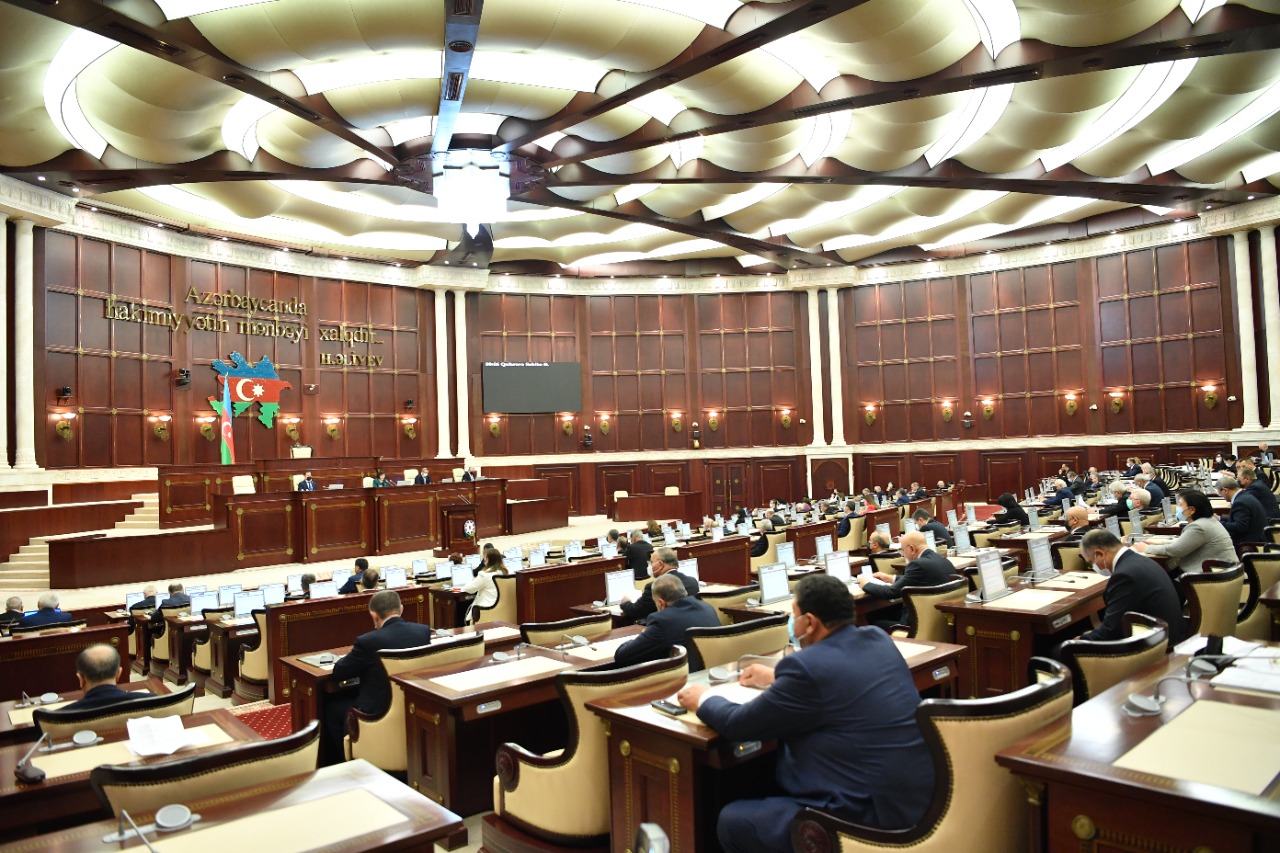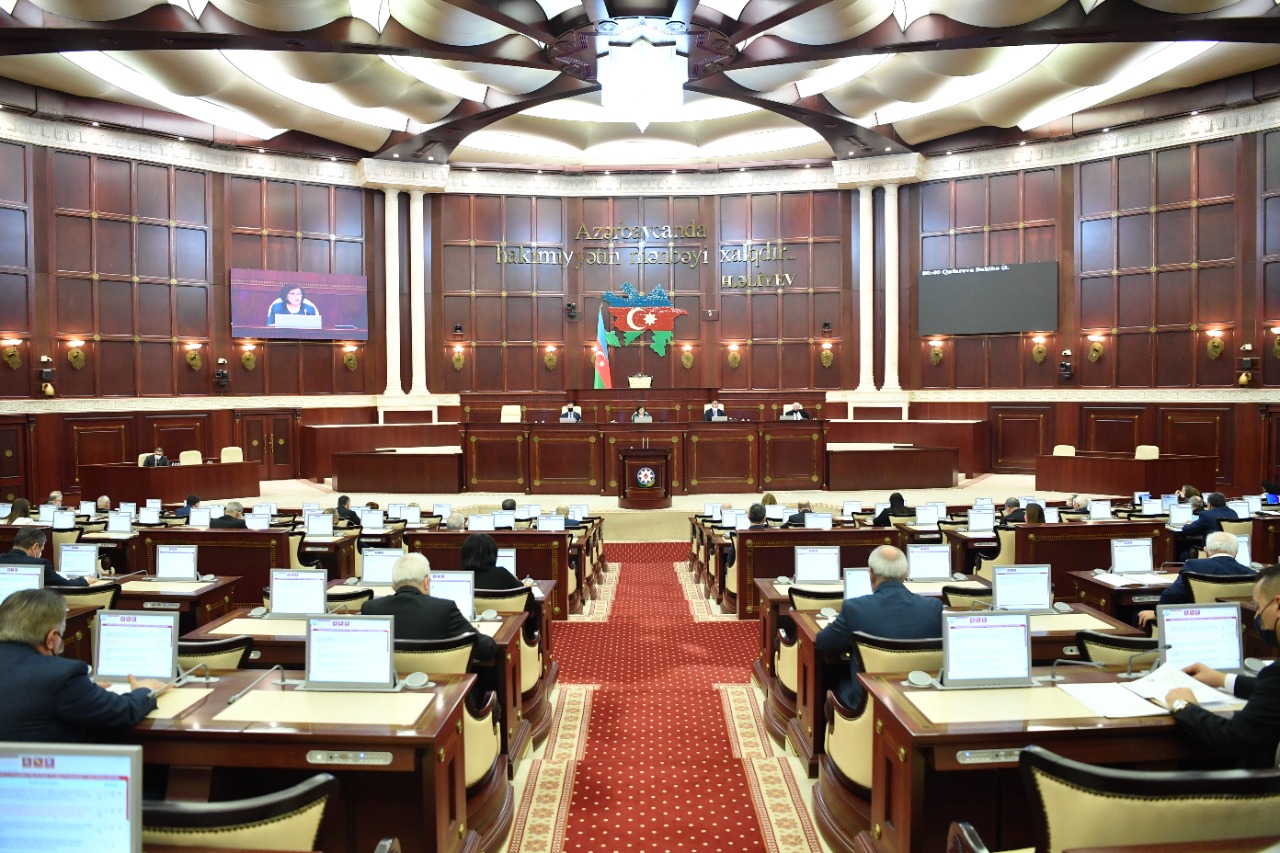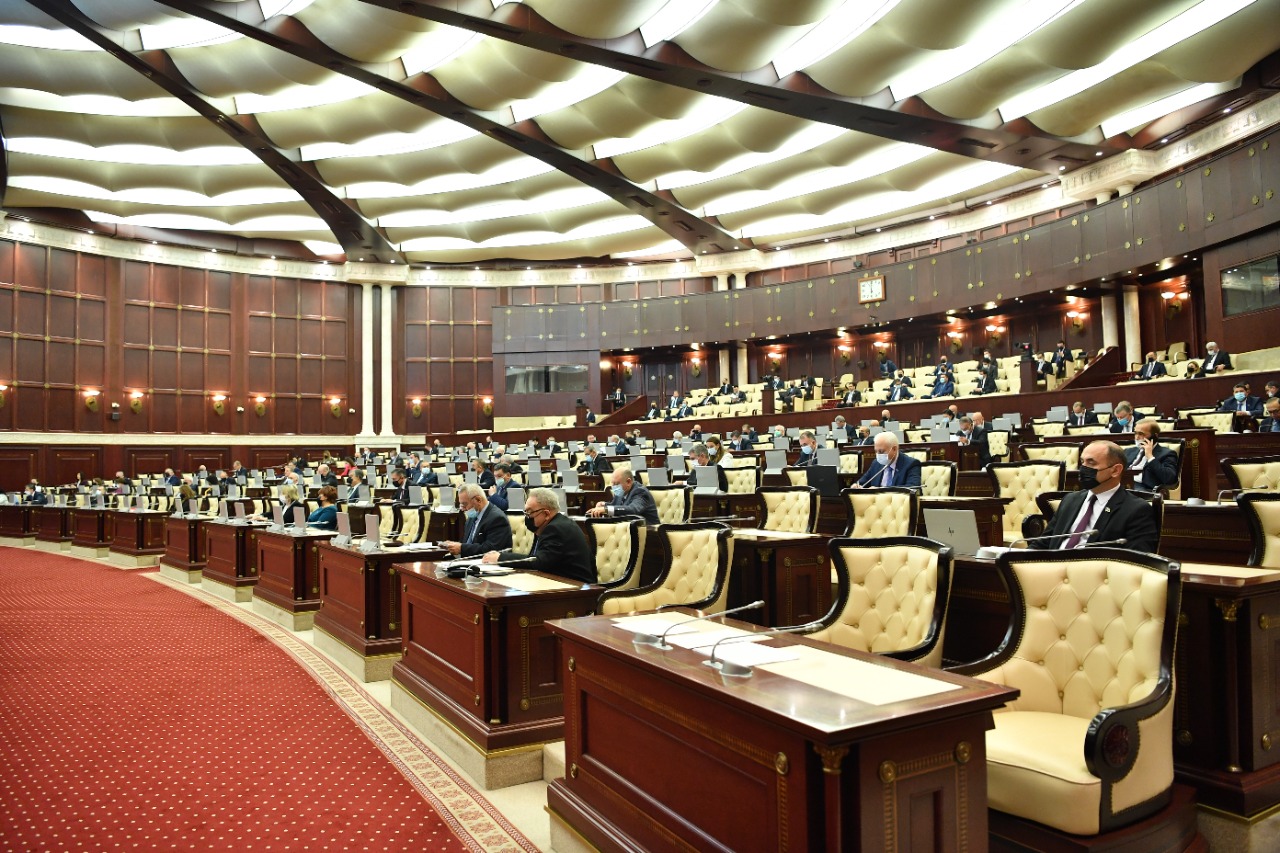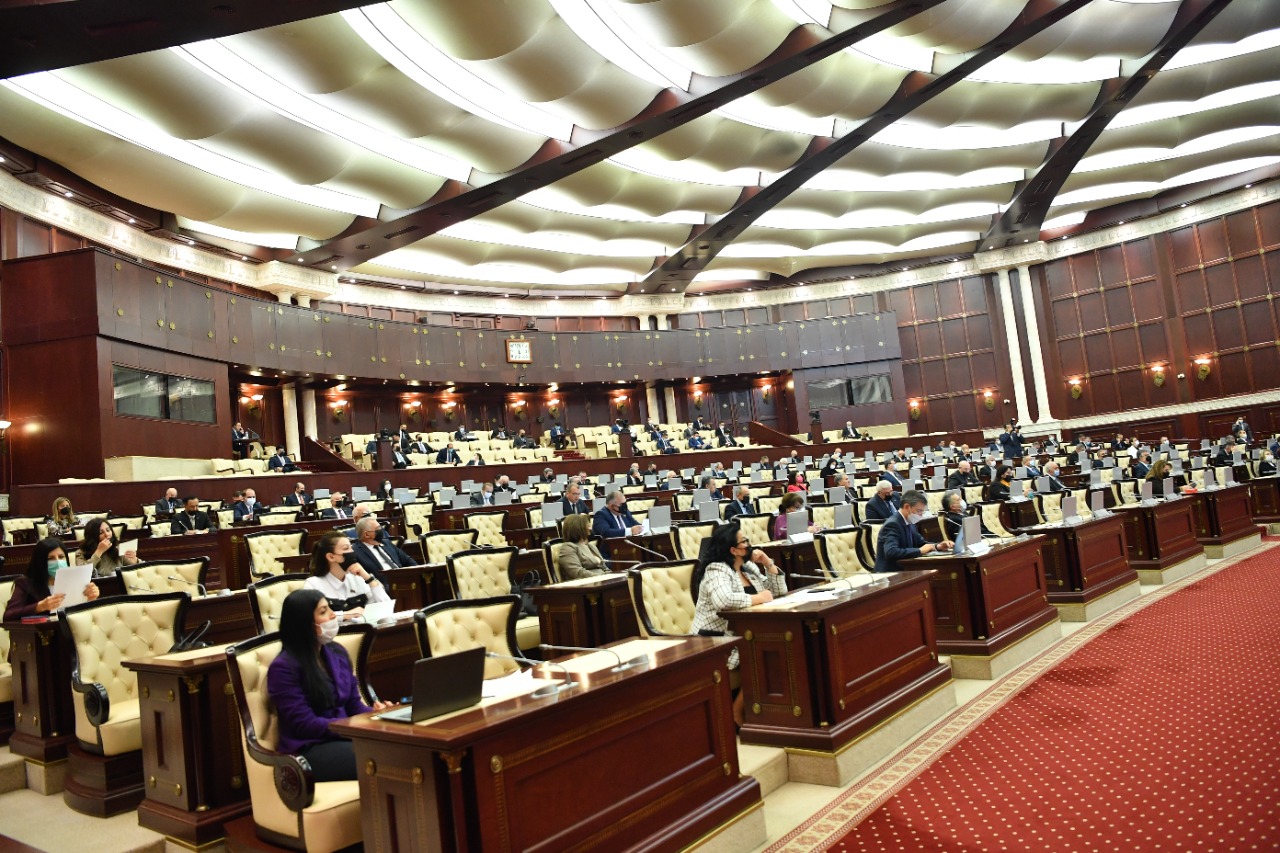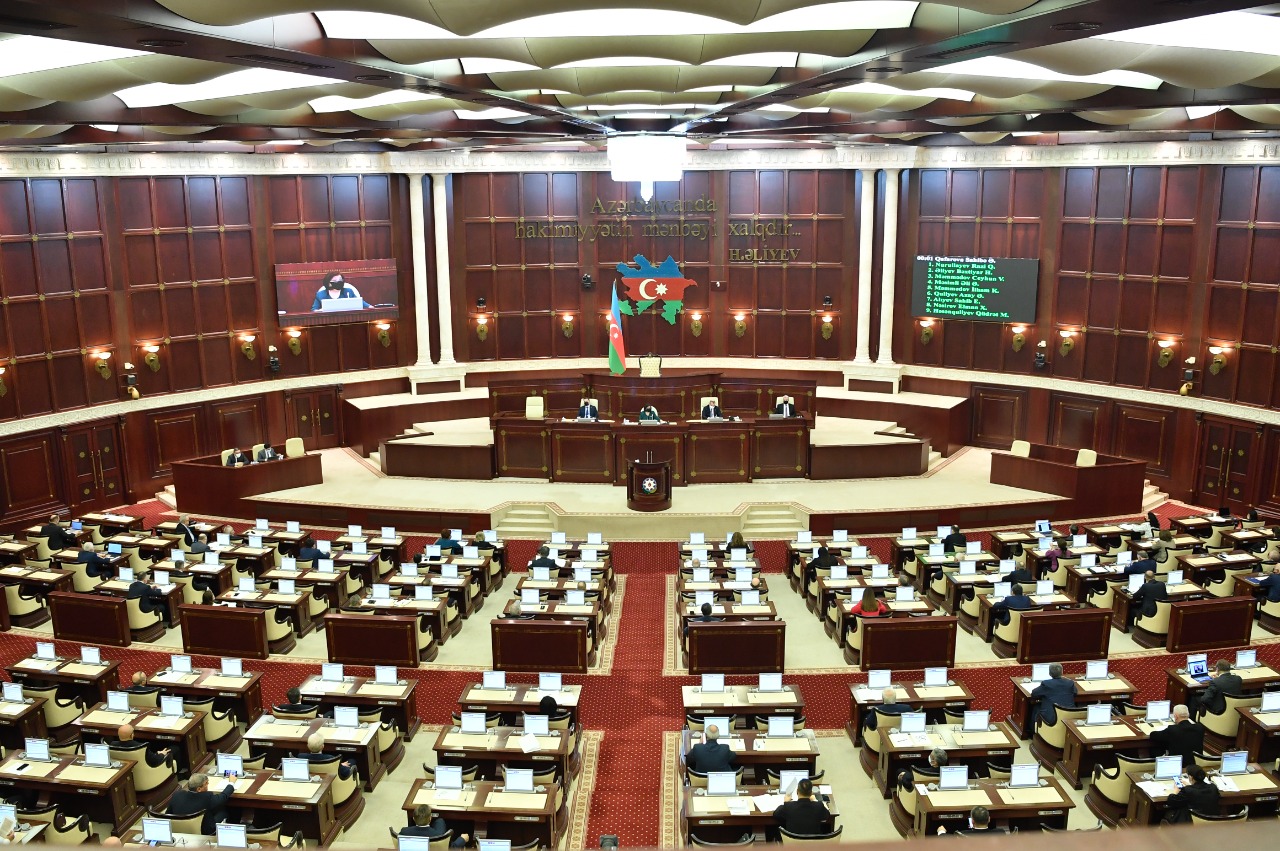Milli Majlis Meets in Plenary
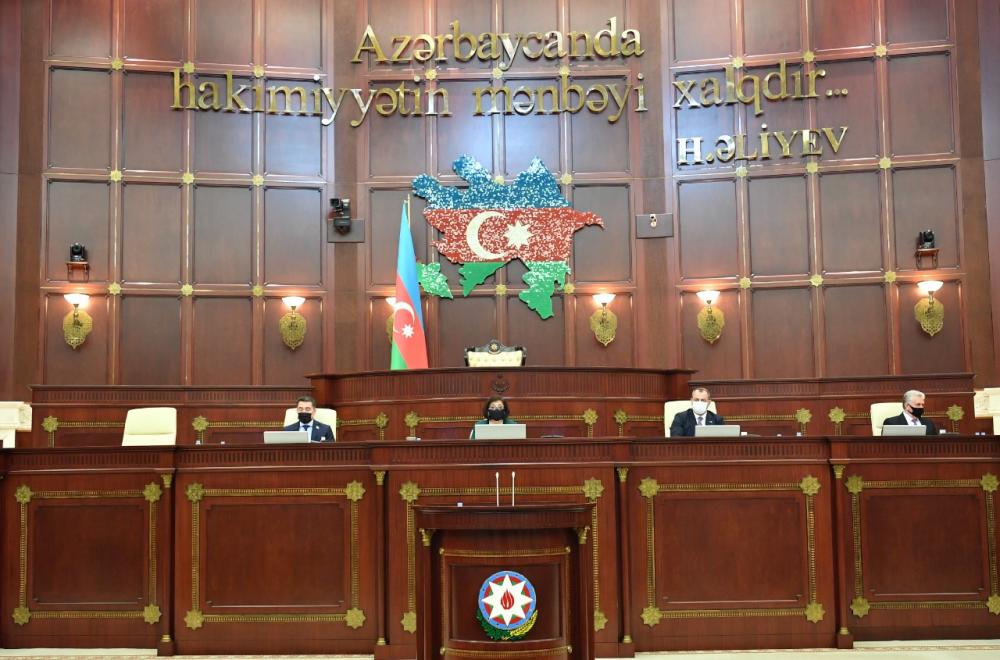
Before the agenda-guided part of the scheduled plenum of the spring parliamentary session could begin on 15 February, Speaker Sahiba Gafarova gave the House a brief account of the official visit of the delegation led by her to the Baltic States on 1-7 February.
Latvia, Lithuania and Estonia are all situated in that region of Eastern Europe which has geopolitical significance; besides, all the three Baltic countries are members of both the European Union and the NATO. The Government of the Azerbaijan Republic and the Baltic Governments are being very keen on promoting bilateral relations and keeping them dynamic; each of the three states has the diverse and mutually beneficial co-operation going with Azerbaijan, according to Sahiba Gafarova.
Incidentally, the Azerbaijani parliamentary delegation’s official tour of the Baltics had been designed specifically to help intensify the political dialogues and, in particular, consider ways to foster inter-parliamentary connexions that add up to one of the dimensions of inter-state relations.
The Baltic tour had begun in Latvia, been continued in Lithuania and concluded in Estonia, said Sahiba Gafarova who, whilst in Riga, had met with Chair of the Saeima Ināra Mūrniece and PM Arturs Krišjānis Kariņš on 2 February and President Egils Levits on the next day.
Our delegation travelled to the Republic of Lithuania on 3 February and the Chair of the Milli Majlis Sahiba Gafarova had a conversation with the Chair of the Seimas Viktorija Čmilytė-Nielsen on that same day. On 4 February, there were meetings with the Lithuanian President Gitanas Nausėda and Foreign Minister Gabrielius Landsbergis.
Last but not least, our delegation were in the Republic of Estonia on 6-7 February and had meetings with the leader of the Riigikogu Yuri Ratas, Foreign Minister Eva-Maria Liimets and President Alar Karis.
The topicality of the conversations with the senior state officials of the Baltic States included promotion of the bilateral political, cultural and humanitarian co-operative bonds with Azerbaijan. The present level of inter-parliamentary interaction was found to be satisfactory albeit it was also said that there was a hefty potential to deepen the bilateral connexions further. Mrs Gafarova was told of the three states’ having always supported and supporting the integrity of the territory of Azerbaijan. Besides, the Baltic vis-à-vis praised our country’s co-operation with the European Union, the Azerbaijani input in the European energy security and the role of Azerbaijan in the countering of the COVID-19 pandemic.
At every meeting, the Chair of the Milli Majlis talked of the new realia established in our region in the wake of Azerbaijan’s victory in the 44-day Patriotic War. It was said each time that Azerbaijan had ridded its lands of the occupation by Armenia that had lasted for thirty years, had made its national territory whole again and, thusly, had had the certain four resolutions of the UN Security Council enforced in the end. That conflict was in the past; a large-scale restoration and building work was under way in the liberated provinces of our country, Mrs Gafarova told the Baltic statesfolk.
Also at the conversations in the Baltic States, Sahiba Gafarova told them of Armenia having turned our all our previously-captured towns and villages into ruins and having also destroyed our historical, cultural and religious sites and artefacts. The Baltic statespeople were made aware of Azerbaijan’s aspiration for solid peace and security in its region. Which is why Azerbaijan has repeated its urges to Armenia to sign a peace treaty that would signal mutual recognition of sovereignty and territorial integrity, provide for the state borders’ delimitation and demarcation to be initiated, let all the regional communications be unblocked and, ultimately, lead to normalised relations.
Whilst sharing her thoughts about the Khojali Genocide that is turning thirty this year, the Chair of the Milli Majlis spoke with praise of the relevant statements made by the groups of friendship with Azerbaijan acting in the legislatures of Latvia, Lithuania and Estonia.
The projects started by our country were mentioned, too, and so were the investment opportunities to hand. Sahiba Gafarova told the Balts about the strategic importance of the Zangazur Corridor, adding that its eventual launch would give rise to new opportunities and not only for our region but also for the EU member-states.
As regards the ties between Azerbaijan and the European Union, the conversations about a new partnership treaty are in the final phase with 90% of the draft’s provisions accommodated already, Mrs Gafarova said at the meetings held during the official tour. The energy co-operation with the EU matters very much as well. Apart from piping crude oil over, Azerbaijan has also become a dependable supplier of natural gas to Europe thanks to the South Gas Corridor, which, too, is a substantial contribution to maintaining the energy security of the Continent.
There had not only been official meetings, Chair Gafarova told the House – our parliamentary delegation had also taken part in a string of events. For instance, they had gone to the Freedom Monument in Riga and put wreaths before it. Besides, there had been excursions to the Latvian National Museum of Art and the National Library of Latvia.
Our delegation had gone to the Antakalnis Cemetery in Vilnius to pay tribute in memoriam of the victims of the 13th of January 1991 events. Wreaths were put at the memorial.
While visiting in the Republic of Estonia, the delegation of the Milli Majlis had gone to the Electronic Estonia Briefing Centre in Tallinn and were made familiar with its workings.
Speaker Gafarova summed up her account at today’s plenum by telling the Milli Majlis that the official tour of the Baltic States had been a success, for which she thanked all its participants cordially.
A discussion of the issues du jour followed.
The committee chairman Bakhtiyar Aliyev and the MPs Hikmat Mammadov, Rashad Mahmudov, Rufat Guliyev, Fazil Mustafa, Razi Nurullayev, Jeyhun Mammadov, Elshad Mirbashir oglu, Naghif Hamzayev and Bahrouz Maharramov remarked commandingly on the parliamentary delegation’s visit of the Baltics and underscored the importance of the negotiations held during it.
They also talked about the effecting of the Shusha Declaration that signifies the Azerbaijani-Turkish partnership and is inked by the presidents of the two countries. That was a very serious step to be taken in the history of both states – one taken towards our security within the system of international relations.
Also, the law-makers shared their thoughts about yet another trip of President Ilham Aliyev and First Vice President Mehriban Aliyeva to Agdam; their keeping the public up to date on the Garabagh restoration projects including the heritage and national history monument restoration efforts of the Heydar Aliyev Foundation was mentioned with a special stress.
Other issues high up on the national agenda and constituent concerns were brought up, too.
Consideration of the eleven items on the agenda of the plenum ensued. Sahiba Gafarova said that the first two points at issue were draft ratification resolutions regarding inter-state treaties and, because those treaties were international documents, the drafts would be considered and sanctioned in one reading only.
The chairman of the Agrarian Policy Committee Tahir Rzayev came up with the Azerbaijani-Turkish inter-state treaty of food security co-operation. Signed in Ankara on 28 September 2021, it envisages promotion of co-operation in that field as well as keeping foodstuff imports and exports secure and a build-up in the potential of the trade relations in the food sector.
The chairman of the International and Inter-Parliamentary Relations Committee Samad Seyidov indicated a favourable conclusion drawn about the treaty; MP Ali Masimli made known his remarks regarding the document’s significance and ventured a few proposals.
The Bill was put on vote and approved in one reading then.
Next, the chairman of the Defence, Security and Counter-Corruption Committee Ziyafet Asgarov tabled the inter-state treaty between the Azerbaijan Republic and the Kingdom of Spain about protection and exchange of confidential information. The 17-chapter deed signed in Madrid on 14 December 2021 encompasses the form and methods of this co-operation between the two countries’ state authorities, exchange of data of interest to both and so on. Incidentally, Mr Asgarov said, Azerbaijan had concluded such treaties with several countries to date.
Again, Samad Seyidov made known the positive opinion of the International and Inter-Parliamentary Relations Committee about the treaty. MP Razi Nurullayev found it necessary to voice his own thoughts and ask a few questions. Tahir Rzayev replied to the questions, after which the Milli Majlis voted in favour of the one-reading approval of the ratification resolution.
The head of the Health Care Committee Ahliman Amiraslanov presented to the House the draft amendments in the first reading to the Medical Insurance Law after that. It follows from the edited Article 15-11.8 of the Law that the payment deadlines for the insurance fees chargeable for the excisable goods as per Article 15-10.1.7 shall be governed by Article 191.1 of the Tax Code where the said goods have been produced by the tax-payer and by Article 191.3 if the goods in question are imported. The amendments pursue the goal of introducing a controlling mechanism to be applied to the compulsory medical insurance fees payable specifically in connexion with imported excisable goods.
Besides, the Law sets the sum of co-finance of damage or loss incurred by an insured event not covered by the compulsory medical insurance and redeemable by the tax-payer. It follows from Article 16-4.4-1 of the Law that the paragraphs of the Articles 15-28.3 and 15-28.4 concerning the co-financed sum shall have been in effect as of 1 January 2022. Those articles shall be effective as of 1 January 2023 to ensure public accessibility of health care services, to guarantee completion of the large amount of work to be done on the compulsory medical insurance facility and, lastly, to let an appropriate system be formed and put in place.
Comments came from the committee chair Ganira Pashayeva and the MPs Soltan Mammadov, Razi Nurullayev and Etibar Aliyev. They found that the Bill was important as much as it was modern. Questions were asked and proposals and remarks were made. Ahliman Amiraslanov answered the questions and shed light on those points that had attracted the MPs’ attention.
The Bill was voted through the first reading eventually.
Further, the chairman of the Defence, Security and Counter-Corruption Committee Ziyafet Asgarov tabled the second-reading amendments to the Law ‘On the Armed Forces of the Azerbaijan Republic’, which, he said, defined a procedure for targeted and separate logistical supplies for the Army and the other uniformed branches included in the Armed Forces of the Azerbaijan Republic, in peace time and at war (in armed conflicts). The amendments are based on both the relevant international experience and the experience garnered during the Patriotic War of 27 September-10 November 2020.
Consequently, no differentiation is made between a time of peace and periods of real threats but only the periods of peace and war (armed conflicts) are distinguished when the logistical supplies procedure(s) and norms are defined for the Armed Forces. In addition, it is determined that it is more expedient to adopt a logistical supplying procedure and supplying norms for each uniform branch separately. So, the Bills’ enactment will lay a foundation for defining the separate logistical supplies procedure(s) and norms for the Army and the other uniformed services of Azerbaijan.
The committee chairman Siyavush Novruzov and the MPs Razi Nurullayev, Fazail Agamali and Gudrat Hasanguliyev made their remarks concerning the amendments. Ziyafet Asgarov, in turn, responded to them and then, the Bill was voted through the second reading.
Sahiba Gafarova said then that the Items 5 and 6 of the agenda had arrived at the Milli Majlis in one parcel sent by the President of the Republic, and were interrelated by substance.
After that remark, there followed an overview of the second-reading amendments to the Gas Supplies Bill provided by the chairman of the Natural Resources Committee Sadig Gurbanov. The amendments are intended to perfect the legislative prevention of carbon monoxide poisoning cases and gas explosions; they are important and timely when it comes to protecting human lives. The Bill envisages a transfer from the state authorities to the gas distributing organisations of the inspection and maintenance authority with regards to gas devices and mains, chimneys as well as ventilation and blow-through circuits, which is deemed to bring about prompt elimination of adverse situations, be it real or potential, which could bear negatively on the efficiency of gas equipment and liens inspections and maintenance whilst also increasing the responsibility of the gas distribution companies and bettering control and administration in the field of gas sales and relevant technical services.
After that, MP Kamal Jafarov of the Law Policy and State-Building Committee briefed the House on the second-reading amendments to the Code of Administrative Offences, which, he explained, concerned violations of the legislative requirements applicable to distribution and consumption of gas. It is proposed that Article 279.0.1-1 be added to the Code to cover failures to observe the maintenance rules concerned with gas installations and lines, chimneys as well as ventilation and indoors blow-down circuits.
Detecting and eliminating in a timely manner the negative situations that jeopardise the natural environment, human health and human property as well as increasing the accountability of all those activities are addressed in the new edition of the Code’s Article 542. That article introduces the following fines: AZN 200-400 for physical persons, AZN 1,000-1,500 for office-holders and AZN 2,500-3,000 for legal persons.
The amendments were commented by the MPs Naghif Hamzayev, Tahir Karimli, Iltizam Yusifov, Sabir Rustamkhanli, Aydin Mirzazade and Fatma Yildirim. Kamal Jafarov replied to them, whereafter the Bills were put on vote and adopted in the second reading one by one.
Deputy Chair of the Milli Majlis Fazail Ibrahimli who also chairs the Committee for Public Associations and Religious Entities then told the House about the second-reading amendments to the Freedom of Faith Law. He emphasised the full compliance of the Bill with the second-reading requirements and responded to the remarks made during the first reading of the amendments.
It is proposed to streamline the law articles in part concerning appointment of clerics to Muslim worshipping places and shrines as well as regarding establishment and state registration of religious organisations and communities. Also, according to Mr Ibrahimli, to keep pace with the times, monetary donations may be accepted not only in the orthodox forms but also via banks, by post, plastic cards, e-payment systems and online platforms. Besides, donation acceptance procedures shall be set by an office designated by the relevant executive authority body to make sure that the activities in this area are kept transparent.
Responses came from the MPs Gudrat Hasanguliyev and Malahat Ibrahimghizi, followed by the commentary by Fazail Ibrahimov, after which the Bill was voted through the second reading.
First Deputy Chair of the Milli Majlis/Chairman of the Law Policy and State-Building Committee Ali Huseynli then tabled in the first reading amendments to the constitutional Law ‘On Regulatory Legal Acts’. Mr Huseynli described them as being of the unifying nature. For instance, Article 1.1.1 of the decree of the President of Azerbaijan dated 8 February 2022 and concerning the enforcement of the Media Law and regulation of the relevant cases gravitates on harmonising regulatory legal acts in connexion with the inception of the Media Development Agency and the Audio-visual Board of the Azerbaijan Republic. The relevant modifications have been made and the wordings ‘the National TV and Radio’ and ‘the Audio-visual (Board) of the Azerbaijan Republic’ are entered in the Law where appropriate therefore.
Deliberations followed. First Vice Speaker Ali Huseynli responded to the remarks by MP Gudrat Hasanguliyev afterwards and the Bill was adopted in the first reading.
The next items coming up for tabling were the interrelated first-reading Bill ‘On the Partial Changes in the Administrative Territorial Structure of Ganja City’ and a set of draft amendments, also in the first reading, to ‘The List of the Municipalities of the Azerbaijan Republic’ contained in the Law ‘On the Municipal Territories and Lands’. Those were presented by the chairman of the Regional Affairs Committee Siyavush Novruzov. The Bills submitted to the Milli Majlis by the President of the Republic constitute a component of the current reforms that aim to improve the governance, increase the citizens’ satisfaction factor, introduce innovations to the mechanism of processing their appeals and, apart from all that, the Bills matter in that they will ensure that the Budget’s funds are expended economically, according to Mr Novruzov.
The Bill suggests remaking of the territorial division of Ganja City with the intended termination of the current city districts of Kapaz and Nizami with their elimination from the State Register of the Territorial Divisions of the Azerbaijan Republic. The Nizami District’s territorial precincts Nos 1 and 2 would temporarily be deemed subordinated to Ganja City. Also, the precincts Nos 1 and 2 of the Kapaz District as well as the currently-incorporated settlement precincts Javadkhan, Hajikend, Mehseti, Natavan, Sadilli and Shikhzamanli would be deemed, again, parts of Ganja City proper for the time being as the precincts Nos 3 and 4 and the incorporated settlement precincts.
Those changes entail the corresponding corrections that have to be made in the list of the municipalities of the country, Siyavush Novruzov reasoned.
Opinions were sounded by the MPs Mushfig Jafarov, Fazil Mustafa, Kamran Bayramov and Musa Gasimli, after which the Bills were put on vote and adopted in the first reading one after another.
Next up, Ali Huseynli put before the House a set of first-reading amendments to the City-Planning and Building Code, which consist in adjusting Article 102.4-2 to the effect that a building utilisation permit shall be granted to a tenant builder no later than within 2 business days, either in person or by registered post, on condition that a document confirming the tenant builder has paid the relevant state duty. Should no such document be submitted, the permit shall be annulled by the appropriate executive authority or by the body incepted by it, and the tenant builder shall be notified accordingly, again, no later than within 2 business days, either in person or by registered post.
The addendum to the Code that Mr Huseynli talked about explains what the tenant builder’s next steps may be. Namely, if the permit has been withdrawn, a new one may be applied for and such an application would only be required to be accompanied by the aforementioned state duty payment testifying document. And, again, on receipt of the second permit application, the permit, if granted, shall be delivered to the tenant builder within 2 business days at the latest, either in person or by registered post.
This Bill, too, was adopted (in the first reading) and with that, today’s plenary sitting of the Milli Majlis was over.
The Press and Public Relations Department
The Milli Majlis



